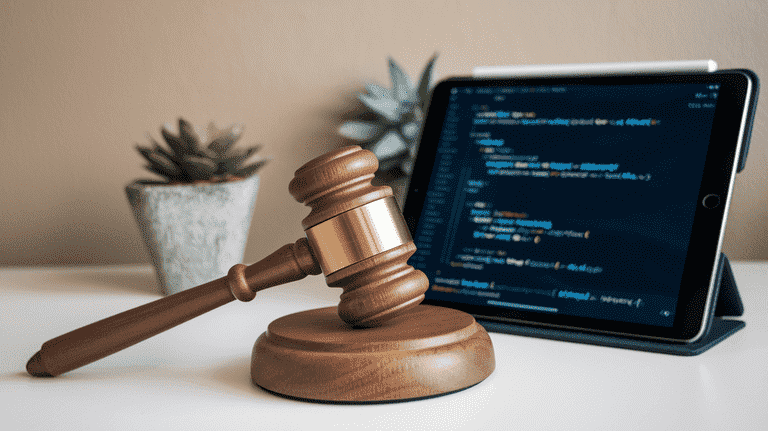Artificial Intelligence (AI) is making waves across many industries, and the legal field is no exception. From streamlining routine tasks to predicting case outcomes, AI is changing law firms’ operations, enhancing efficiency, and reshaping the legal landscape. As AI evolves, it offers incredible opportunities for legal professionals and clients.
This article explores AI’s impact on the legal industry, especially in areas relevant to divorce and family law practices like The Rosenblum Allen Law Firm. Let’s explore how AI is revolutionizing law, the benefits it brings, and what the future holds for this exciting intersection of technology and legal practice.
How AI is Revolutionizing the Legal Industry
AI is no longer just a futuristic concept. It’s here and actively reshaping how legal services are delivered. AI, in law, involves utilizing advanced algorithms and machine learning to automate tasks, analyze data, and even assist decision-making. Let’s look at how this is unfolding in the legal industry.
Explanation of AI and Its Applications in the Legal Field
AI, in law, primarily involves using technologies that can perform tasks traditionally requiring human intelligence. These include analyzing legal documents, conducting research, and even drafting contracts. AI tools are designed to learn from data, identify patterns, and provide outputs that can assist lawyers and legal professionals.
Key applications include:
- Natural Language Processing (NLP): This enables AI to understand and process human language, which is crucial for reviewing legal texts and conducting research.
- Machine Learning: Helps AI systems learn from past cases and data, making predictions about legal outcomes or optimizing legal strategies.
- Automation: AI can automate repetitive tasks, allowing lawyers to focus on more complex, strategic work.
Overview of Legal Technology Advancements Powered by AI
Legal technology, often called “legal tech,” leverages AI to enhance the delivery of legal services. This technology ranges from simple tools like document automation software to sophisticated platforms that predict the likelihood of winning a case.
Recent advancements include:
- AI-Powered Legal Research Platforms: Tools like LexisNexis and Westlaw Edge now incorporate AI to provide more precise and relevant legal research results.
- Smart Contracts: These are self-executing contracts with the terms directly written into code, reducing the need for manual contract management.
- E-Discovery Tools: AI assists in sifting through vast amounts of digital evidence in litigation, saving time and reducing costs.

AI in Law: Key Applications and Innovations
AI’s impact on the legal field is vast, covering various aspects of legal work. Below are some of the most notable areas where AI makes a significant difference.
Legal Research and Case Analysis
Researching legal precedents and analyzing case law can be time-consuming. AI speeds up this process dramatically.
Enhanced Data Retrieval and Research Tools
- Advanced Search Capabilities: AI-based platforms use NLP to understand complex legal queries, making searches more relevant and less time-consuming.
- Summarization of Legal Texts: AI can quickly summarize lengthy legal documents, providing critical insights without reading every word.
Predictive Analytics in Case Outcomes
- Outcome Predictions: AI models analyze past case data to predict potential outcomes based on similar historical cases.
- Risk Assessment helps lawyers assess a case’s strengths and weaknesses, allowing for more informed strategy decisions.
Document Automation and Contract Analysis
Document review and contract analysis are repetitive but crucial tasks in any legal practice. AI tools help by automating much of this work.
Streamlining Contract Review Processes
- AI-Powered Contract Review: Tools like Kira and Luminance scan contracts to identify risks, obligations, and inconsistencies, allowing lawyers to focus on critical issues.
- Automated Clause Analysis: AI highlights key clauses, compares them with standard terms, and suggests edits, reducing the time spent on manual review.
Identifying Errors, Inconsistencies, and Legal Risks
- Error Detection: AI can spot inconsistencies in language or missing terms that might be overlooked during manual review.
- Risk Identification: AI helps identify clauses that could pose legal or financial risks, providing suggestions for revision.
Litigation Support and Strategy Development
AI is changing how lawyers approach litigation, providing tools to support case preparation and strategy.
AI Tools for Litigation Prediction and Strategy Planning
- Predictive Modeling: AI analyzes past cases and suggests strategies most likely to succeed based on similar situations.
- Scenario Analysis: Lawyers can simulate different scenarios to see how various approaches might play out in court.
Impact on Dispute Resolution Processes
- AI Mediation Assistants: Some AI tools assist in mediation by analyzing parties’ positions and suggesting potential compromises.
- Virtual Dispute Resolution Platforms: AI facilitates online dispute resolution, making it more accessible and efficient.
Benefits of AI in Law for Legal Professionals and Clients
AI isn’t just a trendy buzzword; it’s making a real difference in how legal professionals work and how clients experience legal services. AI’s benefits profoundly reshape the legal landscape, boosting efficiency and reducing costs.
Improved Efficiency and Reduced Costs
One of the most significant advantages of AI in law is the ability to get more done in less time, often at a lower cost. This is a game-changer for both law firms and their clients.
- Lower Overhead Expenses: AI automates routine tasks like document review and data entry, which reduces the need for extensive administrative support. This means law firms can operate leaner, saving money on staffing and passing those savings on to clients.
- Faster Turnaround Times: AI-powered tools can handle document analysis, research, and drafting far quicker than humans. What used to take hours or days can now be done in minutes. This speed is crucial, especially in time-sensitive cases.
Enhanced Accuracy and Reduced Human Error
Humans make mistakes, especially when dealing with large volumes of data or repetitive tasks. AI significantly reduces the likelihood of errors that can lead to costly consequences.
- Minimizing Mistakes in Document Preparation: AI’s ability to cross-reference and check documents ensures everything is noticed. It can catch inconsistencies or missing information that a tired set of eyes might miss.
- AI’s Role in Risk Management: By accurately predicting potential outcomes or flagging risky contract clauses, AI helps lawyers make more informed decisions. This means fewer surprises down the road.
Accessibility and Democratization of Legal Services
AI is also making legal services more accessible to the general public. This is a crucial development in bridging the justice gap, where legal help is often out of reach for many.
- More comprehensive Access to Legal Advice: AI-powered chatbots and online platforms can provide essential legal advice or guide individuals through legal processes without hiring an attorney. This is particularly helpful for those who can’t afford traditional legal fees.
- Simplified Processes for Self-Representation: AI tools are helping people represent themselves more effectively in court by providing resources previously available only through expensive legal counsel.

Challenges and Ethical Considerations of AI in Law
Despite all its benefits, AI in law also brings challenges, particularly around ethics, privacy, and compliance. These issues need careful consideration to ensure that AI is used responsibly and moderately.
Ethical Concerns Surrounding AI Use in Legal Practice
AI’s growing role in the legal field raises some important ethical questions. How do we ensure AI is used justly and without bias?
Data Privacy and Security Risks
- Handling Sensitive Information: AI systems often process susceptible data, including personal and financial information. This poses significant risks if these systems are not adequately protected.
- Cybersecurity Threats: AI platforms can be vulnerable to cyberattacks, which could compromise confidential client data. Law firms must invest in robust cybersecurity measures to safeguard against these threats.
Bias in AI Algorithms and Its Impact on Justice
- Algorithmic Bias: AI systems learn from data; if that data contains biases, the AI can perpetuate those biases. This is a serious concern, especially in legal settings where fairness is paramount.
- Impact on Decision-Making: Biased AI could influence legal outcomes, potentially favoring one group. Ensuring that AI systems are trained on diverse and unbiased data is crucial.
Regulatory Challenges and Compliance Issues
As AI becomes more prevalent in law, ensuring compliance with existing regulations and addressing new legal questions becomes more complex.
Ensuring AI Systems Meet Legal and Ethical Standards
- Compliance with Data Protection Laws: Law firms must ensure that their AI tools comply with data protection regulations, like GDPR or CCPA, to avoid legal penalties.
- Transparency in AI Decision-Making: Clients and courts must understand how AI arrives at its conclusions. This transparency is essential to build trust in AI-driven processes.
Potential Need for AI-Specific Legal Regulations
- Evolving Legal Frameworks: As AI advances, existing laws may need to address their unique challenges fully. AI-specific regulations may be necessary to govern its use in the legal field.
- Standards for AI Use in Law: Establishing clear standards and best practices for AI implementation will help guide firms in responsible and
- ethical usage.
AI and the Future of Automated Legal Services
AI is paving the way for a new era of automated legal services. These advancements are changing how law firms operate and redefining legal services.
Growth of Automated Legal Services and Their Impact on Traditional Law Practices
Automated legal services are snowballing, offering clients new ways to engage with legal professionals and access services.
- Self-Service Legal Platforms: Platforms like LegalZoom or Rocket Lawyer allow individuals to handle legal matters independently, using AI to generate documents or provide guidance.
- Virtual Law Firms: AI-powered virtual law firms are emerging, offering everything from consultations to court filings without needing physical office space.
How AI is Reshaping Roles Within Law Firms
AI is not here to replace lawyers but to assist them. However, what it means to work in a law firm is changing.
Changes in Demand for Legal Professionals’ Skills
- Shift Toward Tech-Savvy Lawyers: There is an increasing demand for lawyers who are comfortable working with AI and other legal tech tools. Legal professionals who embrace these technologies can offer more value to their clients.
- Focus on Strategic and Analytical Skills: With AI handling routine tasks, lawyers can focus more on strategy, client interactions, and high-level analysis, roles that AI cannot easily replicate.
The Evolving Role of Paralegals and Junior Associates
- Automated Paralegal Tasks: Many traditional paralegal duties, like document review or legal research, are now handled by AI. This shift is leading to a reevaluation of paralegal roles within firms.
- New Opportunities: Junior associates are finding new opportunities to engage with more complex tasks earlier in their careers, as AI frees up time that would have been spent on mundane work.
Nevada Legal Innovation: AI’s Influence in the Silver State
Nevada is not just home to vibrant casinos and desert landscapes; it’s also becoming a hub for legal innovation. The state embraces AI in its legal system, driving change and reshaping how law is practiced and experienced.
Specific Examples of AI Applications in Nevada’s Legal System
AI’s integration into Nevada’s legal landscape goes beyond just law firms. AI influences how justice is served in the Silver State, from courtrooms to client services.
- AI in Court Systems: Nevada courts are beginning to use AI for case management and document processing, speeding up administrative workflows. AI helps organize case files, set court dates, and even manage evidence more efficiently.
- E-Discovery and Evidence Analysis: AI tools assist lawyers in quickly sifting through digital evidence, including emails, texts, and documents, to find relevant information. This is particularly useful in complex cases involving large volumes of data.
- Online Dispute Resolution (ODR): Nevada is exploring AI-driven ODR platforms that help resolve disputes outside traditional court settings. This makes dispute resolution faster and more accessible, especially for small claims and family law matters.
Nevada’s Legal Technology Landscape and Emerging Trends
Nevada’s legal community is actively exploring and adopting cutting-edge technology to improve services and access to justice.
- Growth of Legal Tech Startups: Nevada has seen a rise in startups focusing on legal technology, many creating AI-powered solutions. These startups are developing tools for everything from automated legal advice to digital contract management.
- Adoption by Law Firms: Many law firms in Nevada, including those in family law, criminal defense, and corporate law, are incorporating AI tools into daily operations. These technologies are helping firms streamline processes and deliver better outcomes for clients.
- Court Innovations: The Nevada judiciary is investing in AI-driven case management systems to handle backlogs and improve the efficiency of court proceedings. This reduces delays and improves the overall experience for those seeking justice.
How AI is Impacting Nevada’s Courts and Legal Processes
AI is not just a tool for lawyers; it’s also transforming how courts operate in Nevada.
- Case Prediction and Sentencing Tools: Some Nevada courts are experimenting with AI tools that analyze past cases to predict outcomes or suggest sentencing guidelines. While still controversial, these tools aim to bring more consistency to judicial decisions.
- Virtual Courtrooms and Remote Hearings: AI-powered video conferencing and virtual courtroom technologies have become essential, especially post-pandemic. They allow cases to be heard remotely, saving time and resources for everyone involved.

The Future of AI in Law: Opportunities and Predictions
The future of AI in law is bright and evolving rapidly. AI offers endless possibilities, from predicting legal trends to enhancing access to justice.
Potential Future Developments in AI Legal Technology
We expect to see even more sophisticated tools and applications that will further transform the legal field as AI technology advances.
- AI-Driven Decision Making: Future AI tools may evolve to assist judges in making decisions by providing real-time analysis of case facts and applicable laws. This could lead to more objective and data-driven judgments.
- Advanced Predictive Analytics: Next-generation AI will offer even more precise predictions about case outcomes, helping lawyers strategize and clients understand their chances of success before stepping into a courtroom.
- Enhanced Client Services: AI could eventually handle more complex client interactions, offering tailored legal advice and document drafting with even greater accuracy and personalization.
Predictions for AI’s Impact on Law Over the Next Decade
AI will likely become an integral part of everyday legal practice in the next decade, driving changes that will impact how law is taught, practiced, and experienced.
- Widespread Adoption of AI Tools: From small law firms to large corporate legal departments, AI adoption will become the norm. Firms that do not embrace AI may find themselves at a competitive disadvantage.
- New Legal Roles and Specializations: As AI takes over routine tasks, new roles will emerge within the legal field. Lawyers may become more specialized, focusing on areas where human judgment, empathy, and strategic thinking are critical.
- Increased Access to Legal Services: AI will make legal services more affordable and accessible, empowering more people to seek justice. This could dramatically reduce the gap in legal service availability, especially for underserved communities.
Opportunities for Law Firms to Embrace AI for Competitive Advantage
Law firms proactively embracing AI stand to gain a significant edge in the competitive legal market.
- Investing in AI Training and Tools: Firms should invest in AI training for their staff and explore new AI tools to improve their service offerings. This can include everything from automated research tools to AI-powered client intake processes.
- Leveraging Data-Driven Insights: By using AI to analyze case data and client feedback, firms can better understand trends and refine their strategies to meet client needs more effectively.
- Offering AI-Augmented Services: Law firms can differentiate themselves by offering AI-augmented services that provide faster, more accurate results. This approach appeals to clients looking for modern, efficient legal representation.

Breaking It All Down
AI is not just an emerging trend in law; it’s a transformative force reshaping the legal landscape. From Nevada to the national stage, AI’s impact is undeniable. It’s making legal processes faster, more efficient, and more accessible. However, as we embrace these technologies, we must also consider the ethical and regulatory challenges they bring. The future of AI in law promises exciting opportunities, but it will require the legal community to adapt, innovate, and maintain a commitment to justice and fairness.

Frequently Asked Questions
What is AI in law, and how is it used?
AI, in law, refers to the use of artificial intelligence technologies to perform tasks traditionally done by legal professionals. This includes legal research, document review, contract analysis, and even predicting case outcomes. AI helps law firms streamline processes, improve accuracy, and provide faster service to clients.
Can AI replace lawyers in the future?
AI is not designed to replace lawyers but to assist them. AI handles routine, repetitive tasks, allowing lawyers to focus on complex legal issues that require human judgment, empathy, and strategic thinking. While AI can perform some tasks independently, human lawyers’ expertise and decision-making skills remain essential.
What are the ethical concerns associated with AI in law?
Ethical concerns include data privacy, security risks, and potential bias in AI algorithms. Since AI systems learn from historical data, they can inadvertently perpetuate biases present in the data, leading to unfair outcomes. Ensuring AI is used transparently and responsibly is crucial to maintaining trust in legal processes.
How does AI impact client accessibility to legal services?
AI enhances accessibility by providing low-cost, automated legal services that make it easier for individuals to seek legal advice and support. Tools like AI chatbots can guide clients through simple legal processes without an attorney, making legal help more affordable and widely available.
Is AI being used in courts, and if so, how?
Yes, courts increasingly use AI for tasks like case management, evidence analysis, and decision-making. For instance, AI tools can help organize court schedules, predict case outcomes, and analyze large volumes of digital evidence, making court operations more efficient.
What are the benefits of AI for law firms?
AI offers numerous benefits, including increased efficiency, reduced costs, improved accuracy, and the ability to quickly handle large volumes of data. By automating routine tasks, AI allows lawyers to dedicate more time to strategic work, enhancing overall productivity and client service.
How does AI affect the roles of paralegals and junior associates?
AI automates many tasks traditionally performed by paralegals and junior associates, such as document review and legal research. This shift allows these professionals to engage in more substantive work earlier in their careers, focusing on tasks that require critical thinking and client interaction.
What challenges do law firms face when implementing AI?
Law firms face challenges such as the initial cost of AI tools, training staff to work effectively with new technologies, and ensuring compliance with data protection and ethical standards. Overcoming these challenges requires a strategic approach and a commitment to adapting to new workflows.

Additional Resources for You from The Rosenblum Allen Law Firm.
In addition to helping with appeals, our lead attorney, Molly Rosenblum Allen, Esq., has created various resources to support you in other legal matters:
Criminal Defense Attorneys: Effective defense for a wide range of criminal charges to protect your rights and future.
Las Vegas DUI Lawyer: Specialized guidance and defense strategies for those facing DUI charges in Las Vegas.
Domestic Violence Lawyer Las Vegas: Compassionate and experienced legal support for domestic violence cases, focusing on protecting your rights.
Drug Possession Lawyer: Aggressive defense for drug possession charges to minimize the impact on your life.
Sex Crimes Attorney: Dedicated representation for sensitive and serious sex crime allegations.
CPS Defense Attorney: Defense against Child Protective Services actions, protecting your family and parental rights.
Misdemeanor Lawyer: Guidance through the legal process for misdemeanors, aiming for the best possible outcomes.
Las Vegas Warrant Defense Attorney: Help with clearing warrants and addressing related legal issues promptly and efficiently.
Las Vegas Probation Violation Attorney: Skilled defense for probation violations to help you avoid harsh penalties.
Theft Crime Defense Lawyer: Representation for theft charges, focusing on reducing charges or dismissing your case.
Kidnapping Lawyers: Effective legal defense for kidnapping charges, prioritizing your rights and freedom.
Juvenile Defense Lawyers: Protecting the rights of minors facing legal challenges, aiming for solutions that support their future.
Firearms Lawyer Las Vegas: Defense for firearm-related charges, ensuring your second amendment rights are upheld.
These resources are designed to provide you with the knowledge and support needed to navigate these challenging legal issues.

Offsite Resources for You
American Bar Association (ABA): https://www.americanbar.org/
The ABA provides extensive resources and information on the legal process, including articles and guides on appeals and other legal topics.
National Association of Criminal Defense Lawyers (NACDL): https://www.nacdl.org/
NACDL offers resources and advocacy for criminal defense attorneys and individuals facing criminal charges, including insights on appeals.
Nevada Judiciary: https://nvcourts.gov/
The official website of the Nevada Judiciary provides direct access to court information, forms, and procedures for appeals and other legal processes.
FindLaw: https://www.findlaw.com/
FindLaw offers a comprehensive collection of legal articles, case law, and guides on various legal topics, including the appeals process.
Justia: https://www.justia.com/
Justia provides free access to a wide range of legal information, including resources related to appeals and Nevada-specific legal issues.
Martindale-Hubbell: https://www.martindale.com/
Martindale-Hubbell offers lawyer directories and legal articles, helping individuals connect with qualified attorneys and learn more about the appeals process.
National Center for State Courts (NCSC): https://www.ncsc.org/
NCSC provides information on court systems, including appeals processes, court administration, and resources for those involved in legal proceedings.

A Special Message from Our Lead Attorney, Molly Rosenblum Allen, Esq

Thank you for taking the time to read through our resources. Navigating legal challenges, especially when you’re far from home, can be overwhelming, but you don’t have to go through it alone. If you need help with your situation or have any questions, please don’t hesitate to reach out. Give me and my team a call at (702) 433-2889, and let’s get the ball rolling. We’re here to support you every step of the way.
Looking forward to speaking with you soon!






